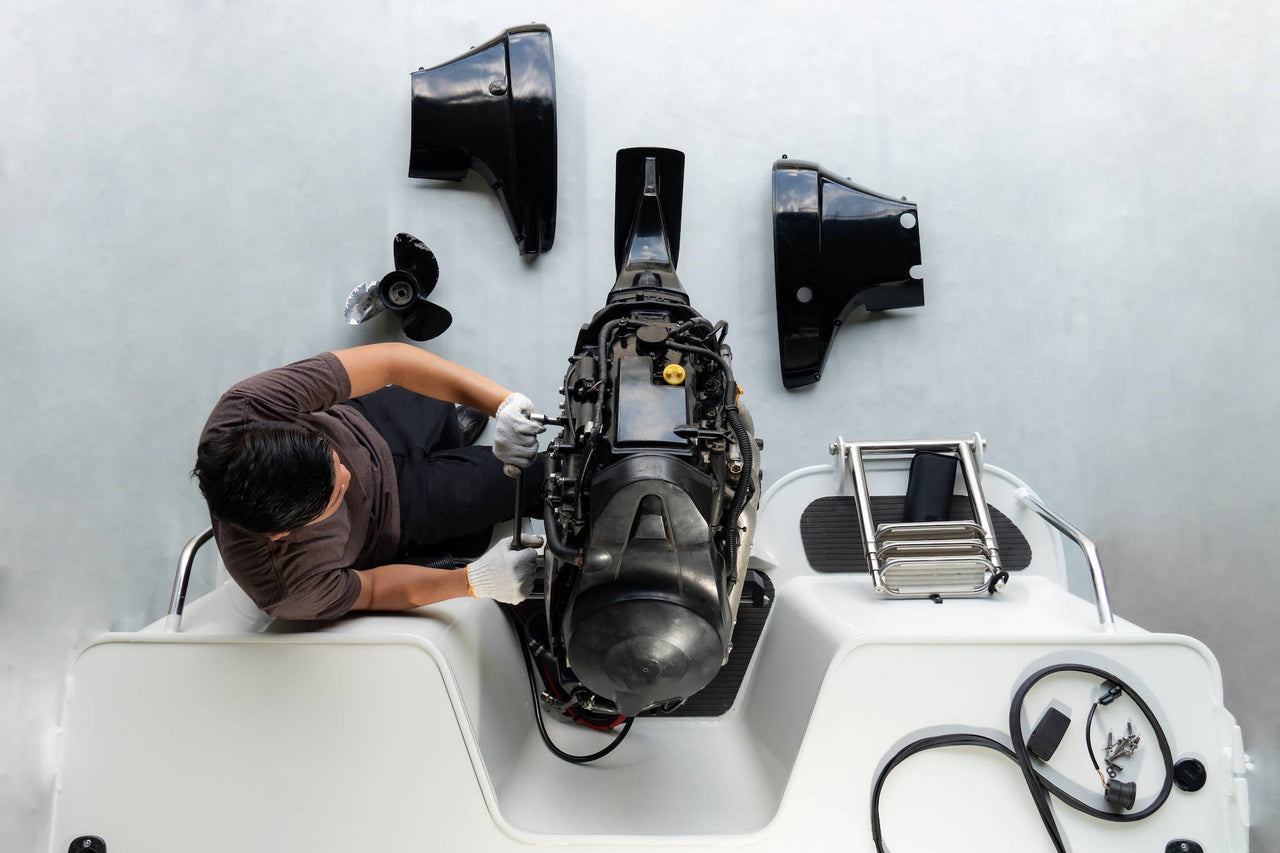For many boaters, there’s one key piece of equipment that will make or break their day on the water. Regardless of whether they’re wanting to zoom to some fishing spots, tow someone riding the wake, or just speed along to feel free from everything they left on land, their outboard motor is the workhorse that makes it all happen. But, to keep that fun going all season long, it’s crucial to follow these four quick tips to maintain your engine and minimize the need for outboard motor repairs during the summer.

4 Quick Maintenance Tips for Minimizing Outboard Motor Repairs During the Summer
1. Look Behind Your Prop
Similar to the routine of removing your propeller at the end of season, it’s important to check behind your prop a few times during the summer. This will help make sure you have top performance and help you catch any common issues like fishing line or weeds that get spun up between the prop and your lower unit. Though you might not even see or notice it before removing your prop, obstructions like those can damage your engine over time as it fights to overcome the extra friction, and this leads to pricey outboard motor repairs.
This can be pretty easy for most weekenders and DIYers, too. Just make sure you have a propeller wrench, a prop chock, and be careful around the blades as you remove it. Then you can simply use some scissors and pliers to pull any fishing line or weeds off before they cause a problem.
2. Perform an Oil Change at 100 Hours
Fresh oil maximizes the life of your outboard motor and keeps it running smoothly and reliably. Besides, new engines are costly and outboard motor repairs aren’t cheap either. That’s why it’s critical to perform an oil change at the end of each season and to maintain it during the summer, too.
If you’re fortunate enough to be fishing or boating 2-3 days a week between Memorial Day and Labor Day, it can be surprisingly easy to hit the 100 hour mark and that’s when you need to perform an oil change, regardless of how much more you plan to boat during the calendar year.
Thankfully, newer outboards even make it quite convenient with service tracking apps, but it also works to tally up your time on the water with a calendar. Then you can schedule a visit to your local marine mechanic or get to it yourself by trailering your boat, removing the engine cover, checking the levels with the dipstick, and draining and refilling.
3. Tighten Bolts and Connections Throughout the Transom
Older boats and outboards are especially prone to loose bolts and connections, but it’s important to remember that new boats aren’t necessarily immune. It’s also notable how loose bolts and connections can equate to much more than a minor annoyance as their effects can range from excess vibrations to mechanical failure.
When you do take simple precautions few times a year and make sure everything is fastened tight, you can prevent a variety of issues including:
-
Rougher rides
-
Noise
-
Damaged electrical connections and electronics
-
Inefficiencies like lost speed, fuel economy, mechanical responsiveness, and steering precision
-
Perpetuated wear, tear, and separation either from fasteners that come all the way loose or loose enough to allow sheared hardware
After all, prevention isn’t too hard here as long as you have the right tools. Normally this means having a good socket set, wrenches, and maybe even a few screwdrivers for smaller fasteners.
Also, since trailering and poor road conditions can be a major factor in causing components to come loose, consider using the following gear to protect your boat while trailered:
4. Check the Lower Unit on Your Outboard Motor
It may take a little more effort and know-how to see an issue with your lower unit, but it’s definitely worth it since the lower unit of your outboard motor is critical to having optimal propulsion.
Essentially, when the lubricant in the lower unit of your outboard has water intrusion, cloudiness, and other issues, it’s a sign that your outboard needs at least a change in lubrication, if not other work to prevent those impurities from causing further damage.
Tools for Minimizing Outboard Motor Repairs
It really doesn’t have to take you long at all, but it’s incredibly important to follow the right boat maintenance steps and keep your boat ready for the next trip out. For just about everything you need to get it done, be sure to check our collection of gear to protect and maintain your outboard motor!






